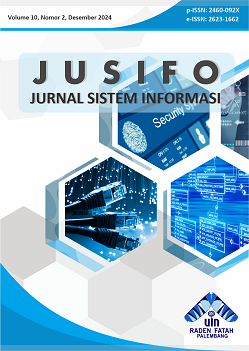Application of the Levenshtein Algorithm for Optimizing Search Accuracy in a Web-Based Knowledge Management System
Main Article Content
Abstract
This study explores the integration of the Levenshtein algorithm into a web-based Knowledge Management System (KMS) to optimize information retrieval for Academic Service Centers (ASC) in universities. By addressing common challenges such as typographical errors during searches, the Levenshtein algorithm enhances the system's ability to deliver accurate results, improving user experience and service efficiency. The KMS is designed to manage diverse knowledge resources, including procedural guides, tutorials, and documentation, while ensuring accessibility and relevance for students and staff. Testing revealed an 88.2% similarity score in handling string mismatches, demonstrating the system’s effectiveness in managing unstructured academic data. The findings emphasize the value of incorporating fuzzy matching techniques for robust knowledge management, particularly in higher education contexts where accurate information retrieval is critical. This research contributes a scalable framework for implementing KMS using string similarity algorithms, with potential applications extending to broader organizational settings.
Article Details

This work is licensed under a Creative Commons Attribution-ShareAlike 4.0 International License.
Authors who publish with this journal agree to the following terms:
- Authors retain copyright and grant the journal right of first publication with the work simultaneously licensed under a Creative Commons Attribution License that allows others to share the work with an acknowledgement of the work's authorship and initial publication in this journal.
- Authors are able to enter into separate, additional contractual arrangements for the non-exclusive distribution of the journal's published version of the work (e.g., post it to an institutional repository or publish it in a book), with an acknowledgement of its initial publication in this journal.
- Authors are permitted and encouraged to post their work online (e.g., in institutional repositories or on their website) prior to and during the submission process, as it can lead to productive exchanges, as well as earlier and greater citation of published work.
How to Cite
References
Adawiyah, R., & Saragih, N. E. (2022). Implementasi algoritma levenshtein distance dalam mendeteksi plagiarisme. Journal Computer Science and Information Technology(JCoInT), 3(1), 54–63. https://jurnal.ulb.ac.id/index.php/JCoInT/article/view/3086
Alavi, M., & Leidner, D. E. (2001). Review: knowledge management and knowledge management systems: conceptual foundations and research issues. MIS Quarterly: Management Information Systems, 25(1), 107–136. https://doi.org/10.2307/3250961
Arnawa, I. B. K. S. (2017). Implementasi algoritma levenshtein pada sistem pencarian judul skripsi/tugas akhir. Jurnal Sistem Dan Informatika (JSI), 11(2), 46–53.
Berger, B., Waterman, M. S., & Yu, Y. W. (2021). Levenshtein distance, sequence comparison and biological database search. IEEE Transactions on Information Theory, 67(6), 3287–3294. https://doi.org/10.1109/TIT.2020.2996543
Damerau, F. J. (1964). A technique for computer detection and correction of spelling errors. Communications of the ACM, 7(3), 171–176. https://doi.org/10.1145/363958.363994
Demarest, M. (1997). Understanding knowledge management. Long Range Planning, 30(3), 374–384. https://doi.org/10.1016/S0024-6301(97)90250-8
Ene, A., & Ene, A. (2017). An application of levenshtein algorithm in vocabulary learning. Proceedings of the 9th International Conference on Electronics, Computers and Artificial Intelligence, ECAI 2017, 2017-January, 1–4. https://doi.org/10.1109/ECAI.2017.8166449
Febiawan, M. H., Setiawan, A., & Primadewi, A. (2019). Sistem pendeteksi dini plagiarisme menggunakan algoritma levenshtein distance. Jurnal Komtika (Komputasi Dan Informatika), 3(1), 18–27.
Indriyono, B. V. (2020). Kombinasi damerau levenshtein dan jaro-winkler distance untuk koreksi kata bahasa inggris. Jurnal Teknik Informatika Dan Sistem Informasi, 6(2), 2443–2229. https://doi.org/10.28932/JUTISI.V6I2.2493
Khalidah, K. (2021). Implementation of levenshtein distance algorithm in the digital biology dictionary search function. Indonesian Journal of Artificial Intelligence and Data Mining, 4(2), 89–96. https://doi.org/10.24014/IJAIDM.V4I2.13989
Laal, M. (2011). Knowledge management in higher education. Procedia Computer Science, 3, 544–549. https://doi.org/10.1016/J.PROCS.2010.12.090
Levenshtein, V. I. (1966). Binary codes capable of correcting deletions, insertions, and reversals. Cybernetics and Control Theory. http://profs.sci.univr.it/~liptak/ALBioinfo/2012_2013/2011_2012/files/levenshtein66.pdf
Liju, P. P. M. (2022). Algorithm to derive shortest edit script using Levenshtein distance algorithm. https://arxiv.org/abs/2208.08823v1
Navarro, G. (2001). A guided tour to approximate string matching. ACM Computing Surveys (CSUR), 33(1), 31–88. https://doi.org/10.1145/375360.375365
Nonaka, I., & Takeuchi, H. (1995). The knowledge-creating company: how japanese companies create the dynamic of innovation. Oxford University Press.
Octaria, O., Ermatita, E., & Sukemi, S. (2019). Penerapan knowledge management system menggunakan algoritma levenshtein. Jurnal RESTI (Rekayasa Sistem Dan Teknologi Informasi), 3(2), 233–242. https://doi.org/10.29207/RESTI.V3I2.1045
Ragab, M. A. F., & Arisha, A. (2013). Knowledge management and measurement: a critical review. Journal of Knowledge Management, 17(6), 873–901. https://doi.org/10.1108/JKM-12-2012-0381/FULL/XML
Sadiah, H. T., Ishlah, M. S. N., & Rokhmah, N. N. (2020). Autocorrect on drugs e-dictionary search module using levenshtein distance algorithm. Jurnal RESTI (Rekayasa Sistem Dan Teknologi Informasi), 4(1), 64–69. https://doi.org/10.29207/RESTI.V4I1.1401
Syarafina, N. N., Palandi, J. F., & Radita, N. (2021). Designing a word recommendation application using the levenshtein distance algorithm. Matrix: Jurnal Manajemen Teknologi Dan Informatika, 11(2), 63–70. https://doi.org/10.31940/MATRIX.V11I2.2419
Udayana, I. P. A. E. D., Putra, I. G. T. A., Udyana, I. P. S., Nugraha, I. G. S. C., Widantari, N. P., & Wijaya, B. K. (2024). Optimizing latin to balinese script transliteration: hybrid jaro winkler and damerau levenshtein methods. 2024 IEEE International Symposium on Consumer Technology (ISCT), 12–18. https://doi.org/10.1109/ISCT62336.2024.10791083
Vidyarsih, P., Abdillah, L. A., & Muzakir, A. (2016). Sistem informasi pengarsipan menggunakan algoritma levensthein string pada kecamatan seberang ulu II.
Wiig, K. M. (1997). Knowledge management: an introduction and perspective. Journal of Knowledge Management, 1(1), 6–14. https://doi.org/10.1108/13673279710800682/FULL/XML

